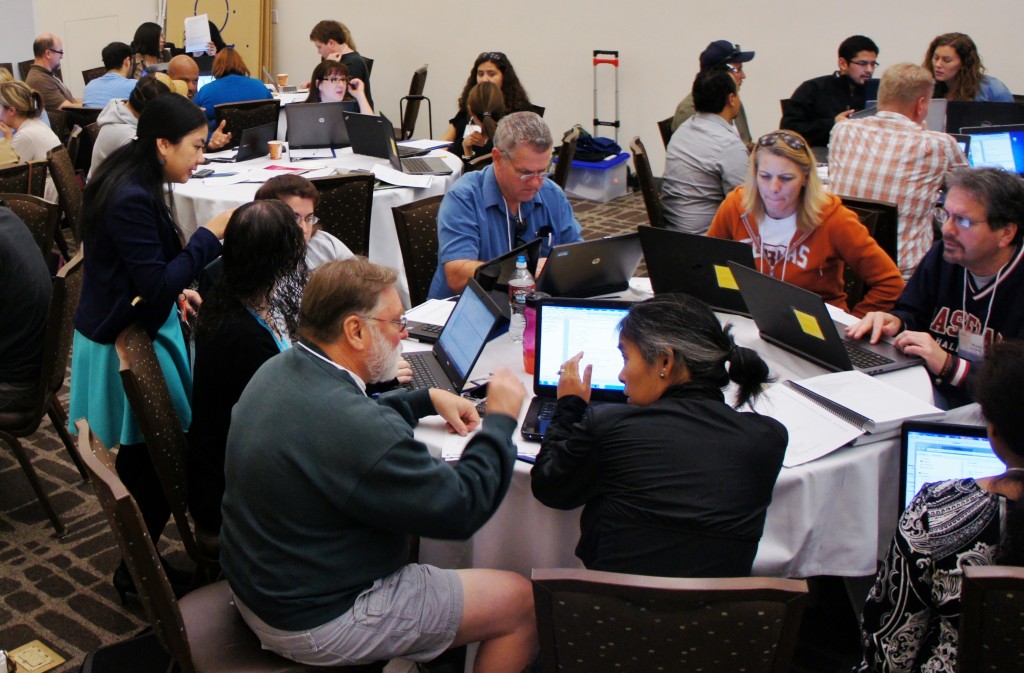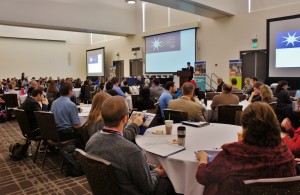Session Title and Descriptions |
Participant Focus |
||||
Session 1 |
|||||
|---|---|---|---|---|---|
| A. RoboBlockly: Hands-on Experience for the Absolute Beginners to Engage Students in Computing, Robotics and Math New to C-STEM? Learn about C-STEM’s RoboBlockly, a web-based robot integrated development environment (IDE) for programming virtual and hardware Linkbot and Lego Mindstorms NXT/EV3 robots. Based on Google’s version, RoboBlockly is designed to help absolute beginners, including pre-readers, quickly and successfully learn to code using math and robotics. All math activities in RoboBlockly are aligned with Common Core State Standards for Mathematics. RoboBlockly prepares students to program in C/C++, the most widely used conventional text-based language in industry and college and can run in any modern browser without installing software, independent of computer operating systems and devices. Attendees will gain experience with block-based programming, Ch code, and robot control. Attendees must bring their own laptop (Windows XP or Mac OS X) and pre-install Google Chrome browser and software from http://cstem.ucdavis.edu/downloads/. 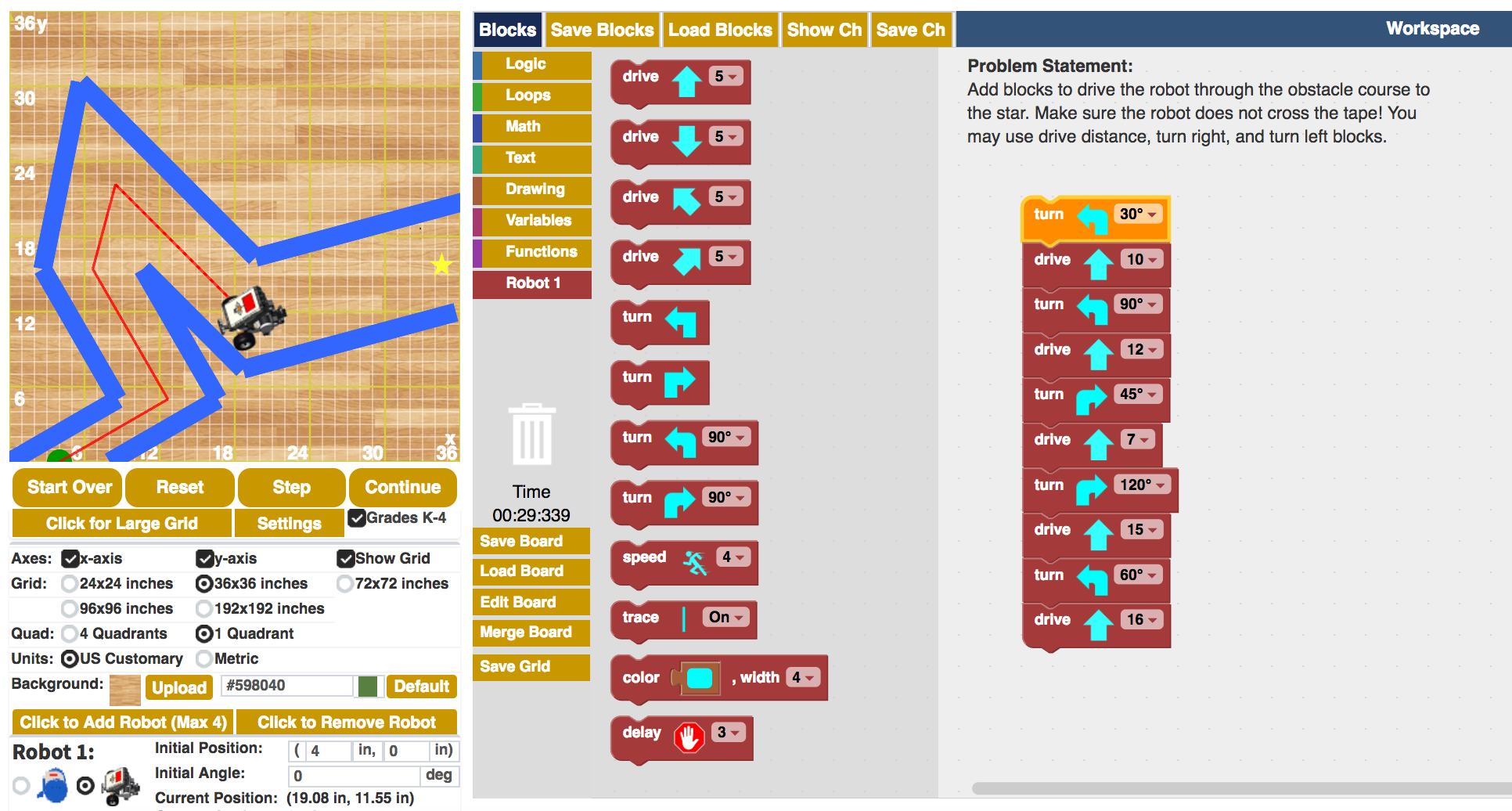 |
|||||
| B. Diversity and Inclusion: Girls In Robotic Leadership (GIRL) and GIRL+ Camps, and Expanded Learning Programs Learn how to promote diversity and inclusion through C-STEM GIRL (Girls in Robotics Leadership) and GIRL+ Camps, Afterschool program and Summer Camps. The C-STEM GIRL camps are focused on motivating middle school girls through peer mentoring to teach computing and STEM concepts through a fun and exciting robotics-based curriculum that culminates with the creation of a C-STEM Day RoboPlay Video. GIRL+ camps are for high school students. Additionally, schools and districts can take advantage of the C-STEM computing resources and robotics infrastructure to use in their expanded learning programs. Learn how C-STEM curriculum is successfully integrated into the GIRL/GIRL+ camps, afterschool program, and summer camps . GIRL/GIRL+ camps are funded by various sponsors and free for camp participants.   |
|||||
| C. Making with Arduino Join this hands-on session to get a deeper understanding of computing with Arduino microcontrollers through C-STEM Studio, Ch Arduino, and ChIDE. Additionally, learn to control Arduino from RoboBlockly directly, combining the hands-on projects of physical computing with the simplicity of block-based programming. Explore the endless exciting possibilities of physical computing and how to incorporate making into your classroom. Arduino boards can be integrated into Math, Computer Science, Engineering, and Robotics courses, including afterschool programs and summer camps. Attendees must bring their own laptop (Windows XP or Mac OS 10.7.5 or higher laptop) and pre-install software from http://cstem.ucdavis.edu/downloads/. Arduino Uno Starter Kits will be provided by the C-STEM Center. 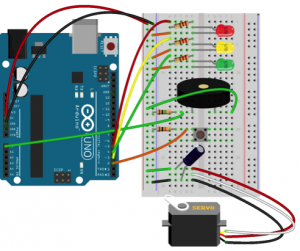  |
|||||
| A1. Secondary School Math with Computing and Robotics: Open the Gate for STEM Careers Student success in Algebra is recognized as a gatekeeper to future STEM Careers. Unfortunately, far too many students are not passing Algebra. In this session, C-STEM teachers discuss their implementation of C-STEM’s Math 7, Math 8, Algebra 1, Geometry, Algebra 2, and Integrated Math 1, 2, and 3 curricula focused on closing the math achievement gap. Teachers show how the C-STEM A-G Approved courses, with C Math credit, helped guide their students through challenging mathematics topics while simultaneously teaching students programming and computational thinking. Learn how teachers use the curriculum and other Common Core-aligned resources to support struggling or failing students. |
|||||
Session 2 |
|||||
| A. RoboBlockly Activity Portal and Classroom Management: RoboBlockly for Classroom Teaching Join this session to gain experience with RoboBlocky’s new classroom management tools and Activity Portal! The classroom management feature can be used to create classes, assign and grade homework, and track students’ performance. The Activity Portal features nearly 500 engaging coding exercises, and the ability to create your own custom activities. Attendees will have the opportunity to access and explore both the classroom management tools and the Activity Portal, as well as edit and generate lessons. This resource is built by teachers for teachers! Join the C-STEM community development effort! Attendees must bring their own laptop (Windows XP or Mac OS X) and pre-install Google Chrome browser and software from http://cstem.ucdavis.edu/downloads/.   |
|||||
| B. Getting Started with Hands-on C-STEM Coding, Robotics and Curriculum for the Absolute Beginner New to C-STEM? Learn how C-STEM is bringing programming and robotics into classrooms and afterschool programs in ways that are engaging all students through hands-on activities and opportunities for competition-based learning. Experience first-hand how computing and robotics can be easily integrated into your teaching of STEM subjects. Additionally, learn how to work with C-STEM Studio, Linkbot Labs, and ChIDE while programming and controlling robots. Attendees must bring their own laptop (Windows XP or Mac OS 10.7.5 or higher laptop) and pre-install software from http://cstem.ucdavis.edu/downloads/. Linkbots will be provided by the C-STEM Center.
|
|||||
| C. Making with Arduino Part 2: Controlling Linkbots Expand your robotics and computing experience by interfacing Linkbots with Arduino boards. Use the new Linkbot Arduino Pack to build interesting configurations and attach sensors, breadboards, and microcontrollers to Linkbots. This combination opens a world of possibilities for robot control, sensory based computing, and creativity. Linkbots and Arduino boards can be integrated into Math, Computer Science, Engineering, and Robotics courses, including afterschool programs and summer camps. Attendees must bring their own laptop (Windows XP or Mac OS 10.7.5 or higher laptop) and pre-install software from http://cstem.ucdavis.edu/downloads/. Linkbot Arduino Pack will be provided by the C-STEM Center.     |
|||||
| B1. RoboPlay Competition for Competitive Learning The RoboPlay Challenge Competition is a theme-based level playing field robotics competition for K-12 students. It is designed for students to showcase their real-world math problem solving skills in a competitive environment. Solution videos for all previous challenges are available on-line. The RoboPlay Video Competition is a robotics-centric video competition for K-12 students. It is designed for students to learn robotics while having fun and exploring their creativity in writing, storytelling, art, music, choreography, design, video editing and film production, and at the same time seamlessly learning C-STEM subjects. In this session, a panel of teacher advisers and students of previous RoboPlay winning team will share their experience on how to successfully prepare for the competitions and bring the competitive learning to classroom. The RoboPlay leadership team will also provide many updates and receive your suggestions for the upcoming 2019 RoboPlay Competition, including new division for 5-6 graders and Arduino and Raspberry Pi for RoboPlay Video Competition.   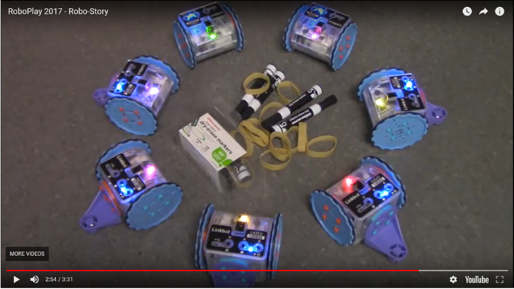  |
|||||
Session 3 |
|||||
| A. Art and Animation: Full STEAM Ahead This session shows how the C-STEM program integrates Art into STEAM education by giving students the opportunity to explore their artistic and creative talents using music and visual media. See how C-STEM’s curriculum and activity resources support the development of artistic talents through various channels including movie making, drawing and animating with coding, programming hardware robots to play melodies, and generating a gallery of graphics. Attendees must bring their own laptop (Windows XP or Mac OS 10.7.5) and pre-install software from http://cstem.ucdavis.edu/downloads/       |
|||||
| B. Making Cyber-Physical System Robots (CPSBot) from the Ground Up Want to learn how to incorporate making, computing, and mechanical design into your classroom with an exciting curriculum that has a culminating project? Consider building the Cyber-Physical Systems Robot! This robot combines the fun of building, circuitry, and programming. Learn more about the C-STEM A-G approved course of Principles and Design of Cyber-Physical Systems. Attendees must bring their own laptop (Windows XP or Mac OS 10.7.5) and pre-install software from http://cstem.ucdavis.edu/downloads/ CPSBots will be provided by the C-STEM Center.   |
|||||
| C. Raspberry Pi for Physical Computing Join this session to learn more about the Raspberry Pi, an ultra-low-cost tiny computer designed specifically for educational purposes, and experience how the C-STEM Center’s free CSTEMbian operating system makes it more accessible for teachers and students to create exciting projects from controlling virtual and hardware robots to making interactive electronic devices. C-STEMbian economically and conveniently runs C-STEM Studio in Pi from Windows, Mac, and Chromebooks. Learn more about the new C-STEM A-G approved course of Physical Computing with Pi and Arduino while learning how to use general-purpose input-output (GPIO) pins and the wiringPi library. Raspberry Pi can also be readily used to control Linkbots. Attendees must bring their own laptop (Windows XP or Mac OS 10.7.5) and pre-install software from http://cstem.ucdavis.edu/downloads/ and Bonjour and VNC as described at http://c-stem.ucdavis.edu/c-stembian/get-started/ Raspberry Pi Starter Kit will be provided by the C-STEM Center. 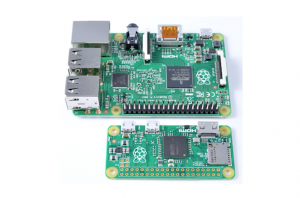  |
|||||
| A1. Engaging Elementary School Students Learning Math and Science with Coding and Robotics Hear how a panel of Elementary School educators have incorporated the C-STEM program in their Elementary Math and Science classes as well as after school programs. C-STEM supports early learners in building confidence and understanding of abstract math and science concepts through applied hands-on robotics and coding activities. |
|||||
| B1. ICT Career Pathway: CS and CTE for All In this session, a panel of teachers discuss the ways they have engaged their students, inspiring them to go on to higher level STEM courses and pursue STEM in college and careers. With several A-G approved courses, students in C-STEM programs are exposed to computing through the required math courses and are motivated to dive into more advanced ICT pathways. Hear CTE/ROP teachers and administrators discuss their experiences using Arduino and other robotics platforms in C-STEM elective computing and robotics courses to prepare students for computing related careers. |
| Legend | |
|---|---|
| Appropriate for Elementary School Teachers | |
| Appropriate for Middle School Teachers | |
| Appropriate for High School Teachers | |
| Appropriate for Administrators | |
| BYOD – Bring your own Device (Windows XP or higher or MAC OS 10.7.5 or higher unless specified) | |





